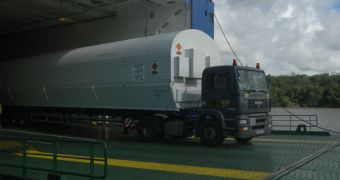Two Russian-built Soyuz delivery systems, of the type used to launch the manned Soyuz space capsules, have arrived at Kourou Harbor on June 18. This is the port facility that connects to the Kourou Spaceport that the European Space Agency operated in the French Guiana, South America.
These rockets are scheduled to carry four satellites into orbit later this year. The four spacecraft are the first components of the new European satellite navigation system, which has been dubbed Galileo.
For launching the 30+ satellites needed to obtain global coverage, ESA opted to rely on the proven Soyuz rockets, which have a remarkable track record when it comes to successful launches.
They are delivered from halfway around the world, ESA officials say. It takes several weeks for the Russian barges to cross the Atlantic Ocean, all the way to South America. Today, they finally arrived at the spaceport, allowing the Europeans to take possession of their precious cargo.
The moment was very well-timed, given that it's only been a couple of months since the Kourou Spaceport inaugurated its Soyuz launch pad, a perfect replica of similar facilities located at the Baikonur Cosmodrome, in Kazakhstan.
Now that two Soyuz ST-B launchers and their Fregat-MT upper stages were delivered to ESA, the agency can begin preparing them for their planned, October 20 launch date. The vehicles will be carrying the first two Galileo In Orbit Validation satellites.
“The rocket hardware left by train from the Soyuz manufacturing plant in Samara, Russia and the Fregat factory in Moscow to St Petersburg harbor, where it was loaded for shipment, leaving on June 3 for French Guiana,” an ESA press release says.
“The next step will be the Launcher Flight Readiness Review, due to take place on July 21. Authorization will then be given to begin assembling the rocket hardware and deploying the initial Soyuz ST-B launcher for the first Galileo campaign,” the announcement adds.
The Galileo verification satellites, PFM and FM2, are still undergoing their final qualification and acceptance tests at Thales Alenia Space in Rome, Italy, but engineers say that they will be ready to fly on time.
The new satellites “are fully representative of the others that will follow them into orbit, combining the best atomic clock ever flown for navigation with a powerful transmitter to broadcast precise navigation data worldwide,” the ESA document concludes.

 14 DAY TRIAL //
14 DAY TRIAL //